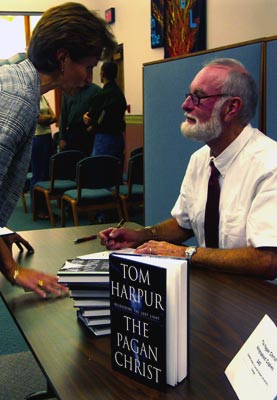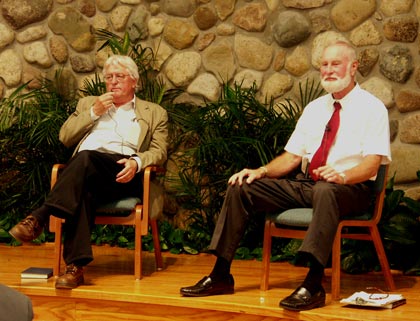Know what is in front of your face and what is hidden from you will be disclosed.

As an internationally renowned writer on religious issues, Harpur is the author of eight bestselling books. Acknowledging that his newest book, The Pagan Christ is very controversial, Harpur says that it has a
risk of opening the heart. People don’t want religion, they want God,
claims Harpur, backing up his statement with statistics. 86% of Canadians consider themselves “spiritual” while only 20% are affiliated weekly with a church. His new book
makes sense and gives them hope for a personal encounter with the divine within.
Harpur’s book addresses issues of the similarities in other religions, and their Gods and special holidays. He claims that
the Bible is a literalist rendition of previous stories, and they are not fresh or original. Like it or not [he says,] we’re connected to pagan holidays such as the winter solstice (Christmas) and the spring equinox (Easter).
The fundamental truths of all sacred language are expressed in terms of myth, metaphor, allegory, and poetry,
says Harpur. He claims that the Bible was written to be interpreted by these methods, and not literally or historically. He says today we are
drowning in literalism,
and we should think of the New Testament with
Christ as you, showing the evolution of the human soul.
One thing Harpur learned during his ‘quest’ is
the fundamental truth about all religion is about incarnation, that there is a God within us.
[As a vision for the church, Harpur says] Christianity needs to change or it will die. [He says that] we need cosmic spirituality to acknowledge our pagan roots, [that] each person carries the spirit of the divine within, [that] all religions and philosophies have the basic ethic of the golden rule, [and] there is no harmony when other religions consider themselves the sole guardians of the truth.

that is easy to understand
and says it indicates how many people yearn for spirituality.
For 20 years, Reimer has stressed the need to rediscover classical creedal Christianity, and his books are an attempt at retrieval. Believing the historicity of the Bible, Reimer says
the issue is not who said what first, but rather what is being said.
Therefore the writers of the Bible used a variety of languages to get their message across.
The human language was inadequate to talk about the ‘mysteries’. [Reimer states that] if similar beliefs (to the Christians) were held by Egyptians, Persians, aboriginals, etc, then so much the better.
The conversation was lively during the question and answer session.
Not unlike two neighbours having a conversation over the fence
said Bert Lobe, who chaired the discussion. This event was attended by over 300 people who paid $20 for a ticket. Funds raised are designated for the Toronto Mennonite Theological Centre, which is a teaching and resource at the Toronto School of Theology and part of the graduate Theological Studies program at Conrad Grebel University College.